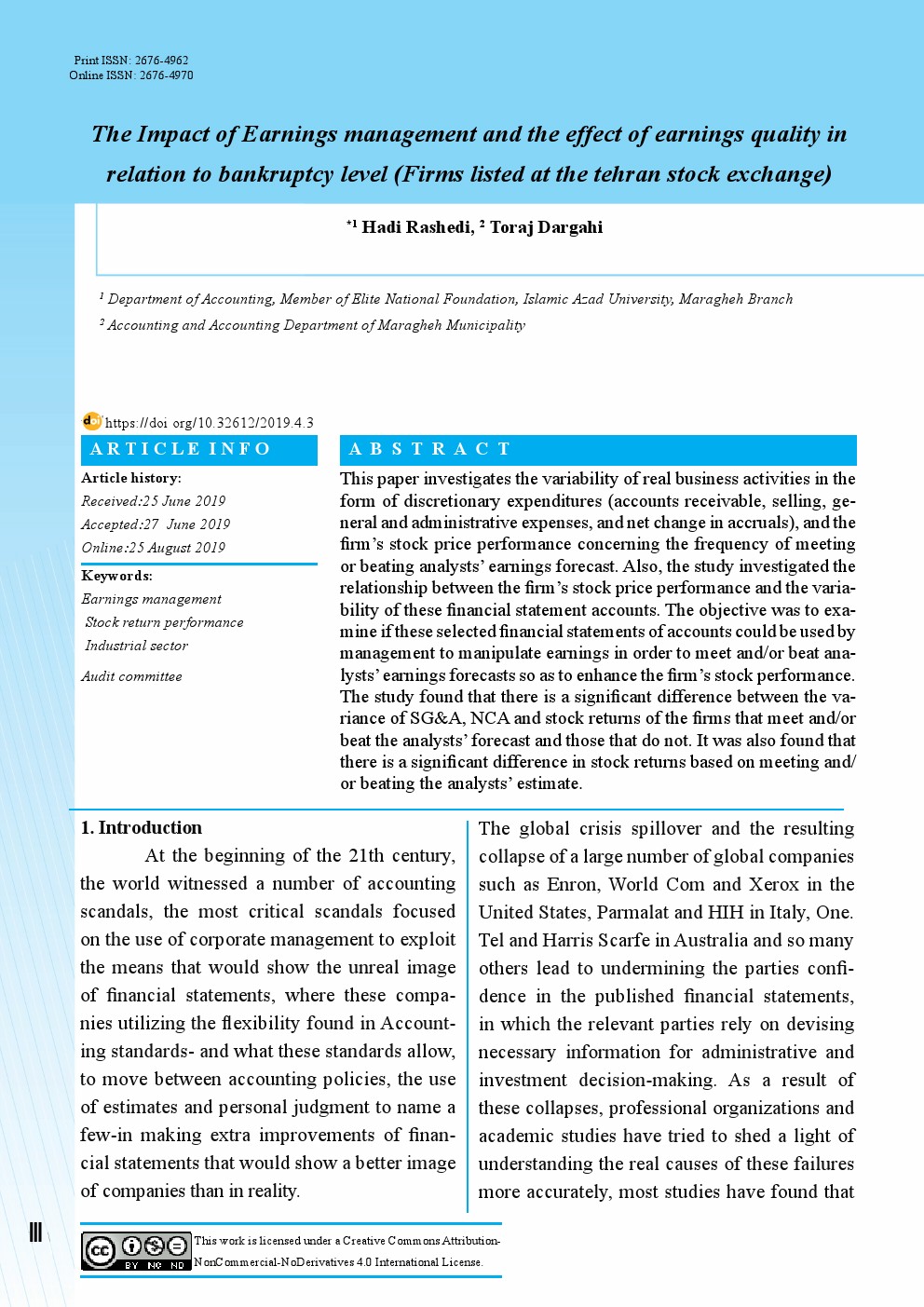The Impact of Earnings management and the effect of earnings quality in relation to bankruptcy level (Firms listed at the tehran stock exchange)
Main Article Content
Abstract
This paper investigates the variability of real business activities in the form of discretionary expenditures (accounts receivable, selling, general and administrative expenses, and net change in accruals), and the firm’s stock price performance concerning the frequency of meeting or beating analysts’ earnings forecast. Also, the study investigated the relationship between the firm’s stock price performance and the variability of these financial statement accounts. The objective was to examine if these selected financial statements of accounts could be used by management to manipulate earnings in order to meet and/or beat analysts’ earnings forecasts so as to enhance the firm’s stock performance.
The study found that there is a significant difference between the variance of SG&A, NCA and stock returns of the firms that meet and/or beat the analysts’ forecast and those that do not. It was also found that there is a significant difference in stock returns based on meeting and/ or beating the analysts’ estimate.
Downloads
Article Details

This work is licensed under a Creative Commons Attribution-NonCommercial-NoDerivatives 4.0 International License.
References
Al Khatib, F., & Al Masaad, R. (1996). The role of financial institutions in financing the industrial sector in Jordan. Public administration, 36(1), 93-124.
Al Khatib, M. (2010). Financial Performance and Its Impact On Corporate Share Returns. Amman, Jordan: Dar Al Hamed Publishing and Distribution.
Kharashka, K. (2010). The effect of profit management on stock returns case study of industrial and service companies listed on Amman Stock Exchange, (Unpublished master’s thesis).
Al Kharshqah, K. (2014). The impact of earnings management on stocks returns the case study of industrial & services companies listed in Amman Stocks Exchange ASE, (Unpublished master’s thesis).
Dagher, M. (2004). Financial Markets (Institutions, Papers, Bursa). Amman, Jordan: Dar Al Shorouk Publishing & Distribution.
Al-Qurum, J., & Abdel-Galil, T. (2008). The effect of settlement of merits under the management’s control of share dividends (A Guide from the Amman Stock Exchange). Journal of Business Administration, 4(2), 123-142.
AL-Qurem, J., & Abd-Aljaleel, T. (2008). The effect of the discretionary accruals on the stock returns (Evidence from Amman Bourse). Jordan Journal of Business Administration, 4(2), 123-141.
Bosnia, H. (2012). The role of the accounting audit in activating control earnings management A study of a sample of Algerian and French economic institutions, (Unpublished master’s thesis). Farhat Abbas University, Algeria.
Haddad, F., & Abu El-Ola, K. (2004). The relationship between economic value added and extraordinary return: An empirical study on industrial public shareholding companies. International Journal of Humanities and Social Science, 1(31), 4-22.
Hammad, T. (2005). Corporate Governance: Concepts, Principles, Experiences. Alexandria, Egypt: University House.
Shaheen, A. (2011). Profit management and risk to the banking environment “An analytical and applied study on Palestinian National Banks”, (Unpublished master’s thesis). Islamic University, Palestine.
Issa, S. (2008). The impact of external audit quality on profit management processes “An empirical study”. Journal of the Faculty of Commerce for Scientific Research Alexandria University, 45(2), 1-47.
Lotfi, A. (2007). Accounting Theory: Measurement, Disclosure and Financial Report on Obligations and Equity. Alexandria, Egypt: Al-Jamaa Publishing and Distribution House.
Securities Depository Center. (2016). [Online] Available: https://www.sdc.com.jo/arabic/index.php
Securities Commission. (2016). [Online] Available: http://www.jsc.gov.jo/Public/mainarabic.aspx?Page_id=841
Almasarwah, A., (2015). Earnings management and its relationship with internal control and corporate governance mechanisms in Iran industrial firms, (Unpublished doctoral dissertation). Loughborough University, UK.
DeAngelo, L. (1986). Accounting numbers as market valuation substitutes: a study of management buyouts of public stockholders. The Accounting Review, 61(3), 400-420.
Dechow, P. M., Sloan, R. G., & Sweeney, A. P. (1995). Detecting earnings management. The Accounting Review, 70(2), 193-225.
Jones, J. (1991). Earnings Management During Import Relief Investigations. Journal of Accounting Research, 29(2), 193-228. 10.2307/2491047
Nuryaman. (2013). The influence of earnings management on stock return and the role of audit quality as a moderating variable. International Journal of Trade, Economics and Finance, 4(2), 73-78. 10.7763/IJTEF.2013.V4.263
Sayari, S., Mraihi, F., Finet, A., & Omri, A. (2013). The impact of earning management on stock returns: the case of Tunisian firms. International Research Journal of Accounting and Auditing, 1(1), 7-21.
iraporn, P.; Miller, G.;Yoon, S. S. & Kim, Y. S. (2008). “Is earnings management opportunistic or beneficial? An agency theory perspective”. International Review of Financial Analysis,17(3), 622–634.
Jones, J.J. (1991). “Earnings management during import relief investigations”. The Journal of Accounting Research, 29(2), 193-228.
Kormendi, R.& Lipe, R. (1987). “Earnings innovations, earnings persistence, and stock returns”. Journal of Business,60, 323-345.
Kothari, S.P.;Leone, L.A. & Wasley, E.C. (2005). “Performance matched discretionary accruals measures”. Journal of Accounting and Economics, 39(1), 163-197
Krishnan, G. (2003). “Audit quality and the pricing of discretionary accrual”. Auditing, 22, 109-126.
Li, F.;Abeysekera, I. & Ma, S. (2011). “Earnings management and the effect of earnings quality in relation to stress level and bankruptcy level of Chinese listed firms”. Corporate Ownership and Control, 9(1), 366-391.http:// www.ssrn.com.Lipe, R. (1990).“The relation between stock return and accounting earnings given alternative information”. The Accounting Review, 65, 49-71.
Lo, K. (2008). “Earnings management and earnings quality”. Journal of Accounting & Economics, 45, 350-357.Penman, S.H. & Zhang, X.J. (2002). “Accounting conservatism, the quality of earnings,and stock returns”. The Accounting Review, 77, 237-264.
Revsine, L.& Collin, Johnson, B. (1999). financial reporting and analysts, prentice hall, upper saddle reviver.New Jersey, p .988.
Richardson, S.; Sloan, R.Soliman, M.&Tuna, I. (2001). “Information in accruals about the quality of earnings”.working paper university of Michigan business school, Ann Arbor, p.52

